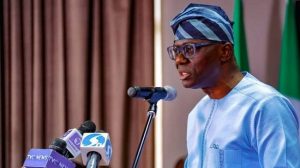There is need for Lagos State Government to resuscitate enforcement of aggressive environmental laws as it was done during the time of ex-governor, Alhaji Lateef Jakande, in order to maintain the position of Centre of Excellence it attained in the early eighties.

Professor Celina Madurmezia, a pioneer staff of the Ministry of Environment and Head, Environmental Services Department, stated this in her keynote address during the Sustainability, Environment and Advocacy (SEA) Awards 2023 on Saturday, November 25, in Lagos.
She opined that the Lagos State Government must intensify its effort in maintaining the status of a cleaner Lagos it has been maintaining for many years now.
“As a matter of fact, Lagos State has done very well in the area of environmental laws and advocacy but the only area that they need to pay attention to is public enlightenment and community collaboration and engagement.
“Before I assumed office in the early 80s, Lagos State used to be the dirtiest in Nigeria, but it became the cleanest because we made the issue relating to environment number one, I remember we set up about 15 mini waterworks across the state because Mr Jakande wanted to make sure that everyone can get water from anywhere they live in the state. We set up sewage which unfortunately has collapsed now. Even the Iju Water Works which is the biggest hardly produces water these days.
“The sitting Governor Babajide Sanwoolu has done so much in the state, he needs to intensify effort in the area of proper public enlightenment, monitoring and enforcement of environmental laws,” she maintained.
Olugbenga Adebola, National President, Association of Waste Managers of Nigeria, in his submission, advocated for proper enlightenment in the area of waste management for environmental sustainability.
He said: “Waste management requires collaborative efforts, all hands must be on deck by doing the needful in order to achieve a cleaner and sustainable environment, we need to begin to show the nexus between the wastes that we generate and our health vis-à-vis our wealth. They say health is wealth but also your health is propelled, and it is sustained by the environment that you live in.
“We need to begin to show that waste is not actually a waste but a resource, how much wealth can you make from the waste, so we need to intensify in our advocacy programmes by way of more public enlightenment and education and of course back it up with laws so that people will know that in whatever waste that you generate, it can be recycled and converted. For instance, Nigeria’s problem with constant electricity, we can generate a large quantum of electricity from the waste that we generate so Nigeria will be better off if we effectively and efficiently manage the wastes that we generate in Nigeria.
Mrs Ajoke Murtala-Muhammed of the Green Belt Movement of Nigeria in her submission advocated for annual tree planting to curb afforestation because the forest cover in Nigeria is now below 30%, causing great concerns for environmentalists.
Her words: “I want to use this forum to appeal to state governors to establish botanic gardens and tree parks in their respective areas. Apart from this, they should also provide plant market for roadside gardeners which will not only provide jobs for our teeming jobless graduates but also boost tourism.
“They will also serve as centres for environmental education for the younger generation.
To join scout in the development of botanic parks and gardens in Lagos State, the Green Belt Movement of Nigeria will donate 2,000 plants providing trees, plants and ornamentals to Lagos State Government for the planting season 2024 and 2025 years.”
Dr. Mahmud Jafaru, Managing Director, Naseni Solar Energy Limited, in his remarks, opined that solar would soon be the next energy source that Nigerians will run to.
“In Nigeria we talk about the 2030 energy mix and the percentage we are expecting to come from renewable energy. We also let people know that there is alternative to provision of energy that is clean and safer. I admit solar source of power can be expensive in the short run but, in the long run, it is better. So, instead of complaining that the sun is too much as Nigerians we should be able to harvest the sun and use it to improve our lives.
“All Nigerians need to do is to look inward, improve and encourage investments in renewable energy sector because if we do that the use of fossil fuel will be minimised, the health status of Nigerians will be improved, jobs will be provided, and the environment will be safer so its going to be a win-win situation.”
In his reaction, Mr. Olakunle Rotimi-Akodu, Senior Adviser to Lagos State Governor on Environment, said: “Our ultimate goal must be to contribute to the establishment of a sustainable development economy in Nigeria, which means we must work together towards meeting the need of the present without compromising the ability of future generations to meet their own need. In the context of the economy.
“This could involve promoting their economic growth, job creation and prosperity in a way that is environmentally responsible, socially inclusive and economically viable in the long term.
“Nigeria with its rich biodiversity and verse natural resources has the unique role to play in the global sustainability effort. We must think globally, understanding that the decisions we make here in Lagos have value chain consequences. By engaging locally, we can create a ripple effect that will positively impact the entire nation,” he concluded.
By Ajibola Adedoye
